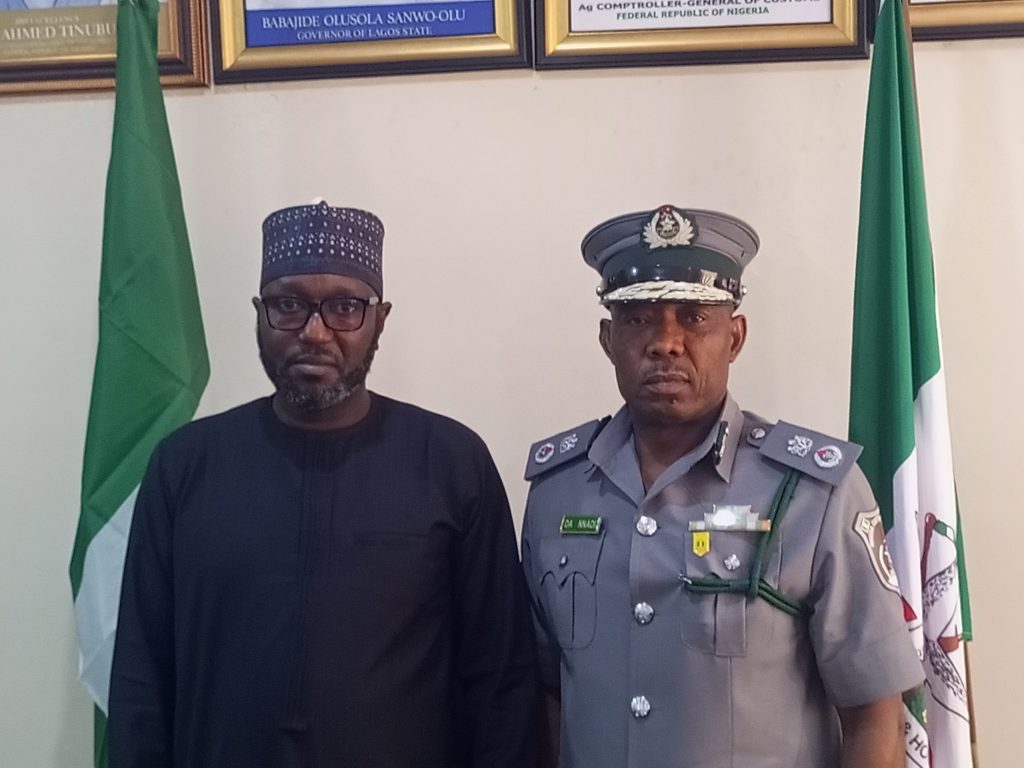…Says our ICT not as bad as being portrayed
The Customs Area Controller of the Tincan Island Port Command, Comptroller Dera Nnadi has challenged the stakeholders in the Nigerian maritime industry especially the freight forwarders to be in the vanguard of projecting the positive impacts being made by the federal government in the nation’s match to port efficiency.
Nnadi who gave this challenge when he hosted the leadership of the Association of Registered Freight Forwarders Nigeria, AREFFN who paid him a courtesy visit in his office recently, reminded them that the more they project the negative sides of the nation’s maritime industry, the more the international community decides to make their shipping hubs in the neighbouring countries.
Addressing the issue of incessant network failure during cargo clearing, the Customs Area Controller acknowledged that it could be possible that the network would fail because it was something that had to do with IT components saying, “Just like we have our telephone lines, sometimes, it will go off, just like you have your DSTVs, sometimes, it will go off. However, you should rejoice in the fact that we have our trade modernization project that we just signed an agreement for which the CG also came back from Vietnam where we went to discuss how to improve on our technology.”
He continued, “Some of you that have been old in the system like your Secretary, know that we have come a long way. We started from what we used to call Bill of Entry that was manual and paper that you can put in your pocket, you can fold, you can meet in the car park and somebody will sign for you. We migrated from there to IDERA, we moved from IDERA to ASYCUDA Basic, we moved from ASYCUDA Basic to ASYCUDA 2.0, we moved from ASYCUDA 2.0 to ASYCUDA++ and then from ASYCUDA++ to ASYCUDA World, from ASYCUDA World to NICIS 1, from NICIS 1 to now NICIS 2 and we are now preparing to migrate to our Trade Modernization Project.
“So, we are not really doing badly and this is what I want you people to project because the more you project these negative ones, the more the international community decides to make their shipping hubs in the neighbouring countries. We are not doing badly. I still recall that we used to bring payment receipts in a box locked by a bank, one key with the bank manager and another key with the Area Accountant and he opens the box and put in another box again and gives it to our dispatch officers who will go and dispatch to the terminals.
“Now you can pay duty and your receipt is sent to me electronically. You receive it electronically and your importer receives it electronically. We are making progress, dear members, we are making progress. President, we are making progress, we are not doing badly as a country. I recall that when the scanning machine was first introduced in Apapa, if you load your container on a truck, then and pay eighty thousand naira which was the cost of transportation, you can stay like three days because of the queue, you don’t examine. Why? Banks may have closed.
“Then it was after your cargo was examined, you went and paid duty, until we introduced e-banking in 2008 with Ecobank and Zenith bank as pilot banks. I was a member of that committee as PRO Apapa Command. Where are we today? You can pay your duty with your phone and you can do so many things and we are literally making progress.
“I don’t want to think that our IT system is as bad as it is being portrayed. There is so much progress being made. Now, I can stay here and verify a container. Yesterday, one of the associations came and there were issues and I just gave her one document and said, go and verify this document on origin intelligence and she verified it in less than one minute and brought it back to me. I can also do that from my phone. So, we are not doing badly.
“For those who are importing vehicles, we have migrated to an extent where officers on duty on the main road can stop your vehicle and use their phones, know whether you paid duty or not. This is progress. So, we are not really doing badly.”
On predictability, Comptroller Nnadi said, “This is excellent! I am happy you brought this out, this is what it should be because your businesses are international businesses. When you enter a contractual obligation with an importer, or an exporter, you should be able to say this is what I am delivering . When you are importing raw materials, this is when my raw materials should reach my factory for me to produce. So, predictability is one of the keys of the KYOTO Convention. So, I am happy that you brought this up.
“And predictability is also anchored in integrity. Alongside with predictability is flexibility on the part of the customs officers too. So, I owe you this and I am happy you also put this and I am also going to do that.”
Photo: Alhaji Bala Lawan Daura, National President, AREFFN and Comptroller Dera Nnadi, Customs Area Controller, Tincan Island Port Command during the visit to the Tincan Island Customs Headquarters by AREFFN recently.
Send your press invite, news, press releases/articles to augustinenwadinamuo@yahoo.com. Also, follow us on Twitter @PrimetimeRepor1 and on Facebook on facebook.com/primetimereporters or call the editor on 07030661526.

